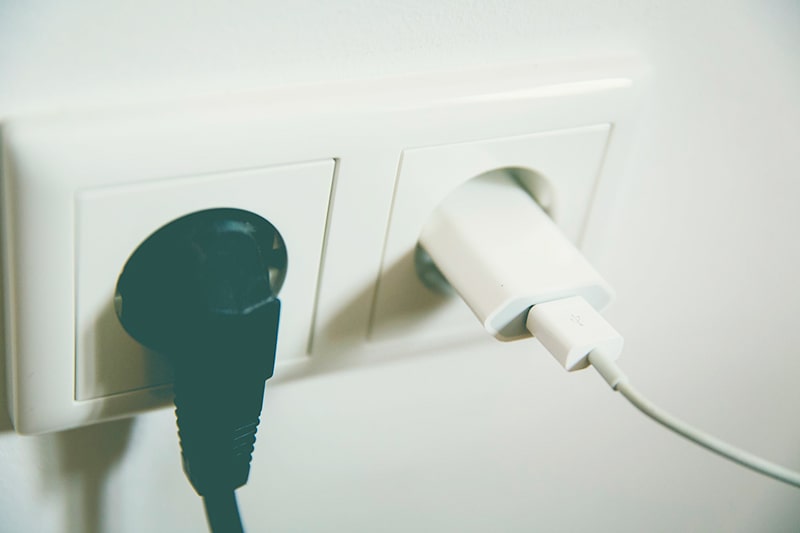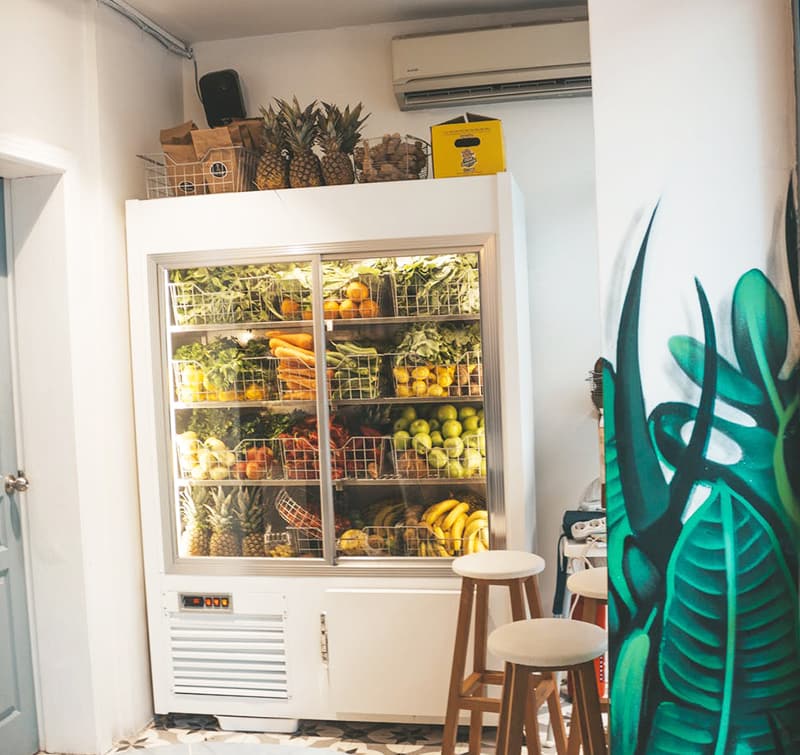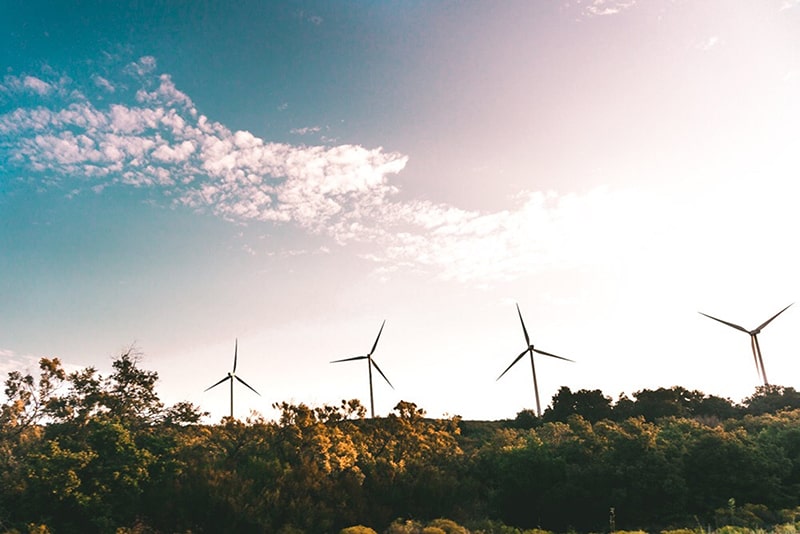Do you want to save energy at home and reduce your electricity bill? Then you've come to the right place! Digitalization is inevitably leading to us using more and more technical devices in our everyday lives.
But the energy from the socket has to be generated. And as long as our electricity mix is not completely renewable energies is based on nuclear energy or fossil fuels such as coal, natural gas and oil, wasting energy is extremely damaging to the environment.
Energy is also expensive. So if you use it sparingly, you can save on a Sustainable way to save money. Fortunately, there really are many things you can do!
In this article, I present the best tips for saving electricity in everyday life. They range from the hob to the TV to the smartphone. Let's go!
28 tips: How can you save energy at home?

In January 2020, one kilowatt-hour of electricity cost about 31 cents.₂ For each kilowatt, approx. 474 grams CO2 emissions.₃ The average electricity consumption per capita in Germany is about 7,176 kilowatt hours.₄ Both for the fight against the Climate ChangeFor us, as well as for our own wallets, it is worthwhile to be conscious of the juice from the socket. So I won't wait too long and give you the best tips for saving electricity in everyday life.
Tip 1: Boil water in the kettle instead of on the stove
Boiling the water in a kettle is much more energy efficientthan putting the pot of water on the stove. So if you only want to boil 1-2 portions of pasta, you can simply pre-boil the water in the kettle and then add it to the pot. This way you can easily save time and energy.
Another tip: Always heat only as much water as you really need!
Tip 2: Cooking with a lid
If you want to cook larger amounts of pasta - or other dishes for which you need water - then you should use the cooking pot and definitely put a lid on it. This will also save you a lot of time and electricity costs, as less heat escape from the pot can.
Tip 3: Use residual heat from stove top and oven
You can also simply turn off your kitchen appliances a little earlier to make use of the residual heat, for which money and energy have already been used. So turn off the oven towards the end of the baking time and leave your cake in for a little longer. After all, the heat didn't disappear with the push of a button.
Tip 4: Use timers
The lighting of the Christmas decoration on the tree or balcony does not have to run 24 hours a day, seven days a week. By using a timer, you can conveniently determine when it should light up and when not. As a rule, you can save more than half of the energy consumed.
Tip 5: Defrost refrigerator & freezer regularly
The thicker the layer of ice in your freezer or refrigerator freezer compartment becomes, the higher is also the energy consumption of the device. Therefore, you should defrost them regularly - ideally every 6 months. The ideal time for this is the cold season, because you can store your food on the balcony or on the terrace.
Tip 6: Switch off unnecessary light
This energy saving tip is self-explanatory. Electric light sources consume electricity. Whether it's your ceiling lamp or the little light on the power strip. So if you don't need a certain light or a technical device, you should turn it off completely.to reduce energy consumption and thus also CO2-emissions and reduce your electricity costs.
Tip: Do you already know the Solar glass? This is a solar-powered, light-giving jar. It charges in the sun and then turns on in the dark. Pretty cool!
Tip 7: Do without the air conditioner
Whether in the car, at home or on vacation - air conditioning systems are often pleasant, but also enormous energy guzzlers. And besides, they often run even though no one is in the room. You can save yourself a lot of money and the environment a huge CO2-emissions by avoiding the use of air conditioning altogether. This will be much easier for you, for example, if you let in the fresh, cool air from outside in the morning and keep windows and blinds closed when the outside temperature is warm. Even a fan is still more economical than an air conditioner.
Tip: If you want to know how to travel by car in a fundamentally more environmentally friendly way, take a look at the post about sustainable driving.
Tip 8: Place the refrigerator in the right place

Your refrigerator should of course not near a heater and certainly not at the sunlit window stand. Otherwise, it will only need more energy to produce cold. Place it in a shady and preferably cool place, with some distance to the wall. And refrain from placing boxes or other things on top of it, so that the heat dissipation runs properly.
Tip 9: Turn down the refrigerator temperature a bit
It doesn't have to be ice cold in the refrigerator. The food also keeps at slightly less cold temperatures and then taste just as good. So you can save energy by turning the temperature knob down a bit - warmer.
Tip 10: Keep hot meals cool outside the refrigerator
Please do not put hot or lukewarm dishes in the refrigerator; let them cool on the kitchen counter first. Thus, your cool buddy does not consume unnecessary energyto cool down the dish and keep the temperature in the refrigerator appropriate.
Tip 11: First think - then open the refrigerator
Try to open the refrigerator only for the shortest possible time. The less warm air that enters from the outside, the more energy and electricity costs you can save. Just be aware of what you want to eat beforehand and don't spend minutes thinking about it in front of the open refrigerator door.
Tip 12: Turn off devices instead of standby mode
Unplug instead of standby! This power-saving tip applies, for example, to televisions, computers and even power strips. You should switch off their lights so that none of your devices are running in economy mode - a mode in which they can still consume electricity unnecessarily.
Tip 13: Use LED and energy saving lamp
LED's produce the same luminosity as halogen bulbs, but are much more energy efficient. Personally, I also find the LED light much more pleasant. Energy-saving lamps are basically worth it!
Notice: In the first versions, the light from energy-saving lamps was not so pleasant warm white. But nowadays they can provide this light, so when switching to energy-saving lamps no one has to worry.
Tip 14: Use water saving shower
After heating, hot water accounts for the highest energy consumption in German households. A shower with a water-saving spray helps save around 20,000 liters of water a year in a 2-person household.₅ As a result, less water needs to be heated for you - and your lifestyle consumes less energy. The calculation is quite simple.
Tip 15: Reduce hot water temperature
In addition to The Economy Shower, of course, it simply pays to take less hot showers. Have you ever thought about a cold shower thought about? I know, there runs one ice cold the back down. But after a week you get used to it and also have personally more energy in everyday life. Save electricity, promote health and protect the environment. It's at least worth a try, isn't it?
Notice: Saving energy by lowering the temperature also works with the washing machine! Not only can you usually do without the pre-wash, but you can also wash your laundry more often at 30° instead of 60°.
Tip 16: Invest in better insulation
With good planning, the insulation of walls lasts a good half century. The Investment pays offas less energy can escape, so electricity costs are reduced and less CO2 will be emitted for energy generation.
Notice: Especially radiator niches should be insulated, because the wall there are thinner and the heat producer is located closer to the cold outside air.
Tip 17: Always fill up the dishwasher and washing machine
The more laundry you have accumulated, the more worthwhile the water and, of course, electricity consumption for a wash cycle with the washing machine. So collect your laundry for a few days longer and reduce the number of your wash cycles.
Of course, the same applies to the dishwasher and also to the refrigerator. The more that's in it, the more electricity costs you can save.
Tip 18: Stream less!
Due to the growing spread of the Streaming platforms, like Netflix or Amazon Videoaround 200 billion kilowatt hours of electricity are now consumed worldwide every year. With some players, you can reduce the resolution quality slightly to save energy. If we're honest, however, it's worth questioning the frequency with which you use streaming services and cutting back a little to do more sport or read interesting books instead, for example. Just an idea 🙂
Tip 19: Manual instead of electric toothbrush
To save electricity, you can also do without the electric toothbrush and instead use a environmentally friendly Wooden toothbrush use. In principle, it is worth questioning the use of devices that actually consume a lot of energy unnecessarily. There are even battery-powered salt and pepper shakers. These are also not absolutely necessary, as spices can also be ground super with manual devices and a hand twist.
Tip 20: Laptop instead of desktop PC

Great power saving potential is offered by the Switching from a large computer to a laptop. The latter usually needs much less energy to enable the longest possible battery runtime. So if you don't necessarily need a PC that is constantly connected to the power, just think about a change.
Tip: You can also surf the internet sustainably! For example, by making a environment friendly search engine or search directly in the search engine and not indirectly via the browser search bar.
Tip 21: Use your laptop, PC and smartphone for as long as possible
The energy consumption in the manufacture of technical equipment is enormous. In addition, this usually requires rare earths such as cobalt, which are mined under questionable conditions. Therefore, appreciate the technology you haveeven more than usual. And make sure that you can increase their useful life, for example by Repairs or Used purchases completely in the sense of the Zero Waste Lifestyle, dragging it out.
Tip: In the article Dispose of electronic waste correctly, you'll learn how to properly recycle the natural resources of your tech devices.
Tip 22: Turn down screen brightness
To save power, you should turn down the brightness of screens. You're probably familiar with this trick from your smartphone when the charging bar is only 1-5 percent. But you can also use this energy-saving tip for laptops and other devices with screens. even if the battery is not about to give out.
Tip 23: Pay attention to energy class when buying new equipment
When buying a new appliance, be sure to check its energy efficiency. This applies in particular to large household appliances such as refrigerators, washing machines and dryers - and of course also to televisions!
The energy classes range from "G" - "A+++". Make sure all your new appliances have at least "A+" ratingto save energy in the long term.
Tip 24: Shock ventilation instead of windows on tilt
A classic among the tips for saving energy! Open your window wide for a few minutes every few hours rather than leaving it permanently tilted. Shock ventilation is enough to freshen up all the air in the room within a short time. Also, you can again reduce electricity costs in the simplest way.
Tip 25: Air dry laundry
A clothes dryer is basically not necessary. Laundry also dries wonderfully on the Clothes horse on the balcony or in the Laundry room. Both in summer and in winter. But make sure that the ventilation or that the moisture can escape elsewhere to prevent mold.
Tip: The same goes for your hair! You don't always have to use the hairdryer, you can just let it air dry to save electricity.
Tip 26: Use hand-operated kitchen appliances
This phrase automatically makes me think of old tractors that had to be cranked by hand. But hand-operated kitchen appliances are not that old-fashioned after all. A Lemon can, for example, also be used with the hand or a Stainless steel juicer squeeze. And one Salt tax with batteries is also not needed, because the mechanical movement of the hands is usually quite sufficient.
Tip 27: Save energy indirectly as well
Not only directly in your household, but also indirectly you can save electricity! Here are a few examples:
- Zero Waste Lifestyle - Save energy consumption for waste collection and recycling.
- Seasonal shopping - Give preference to foods that are also in season that month to reduce energy costs and CO2-emissions for cultivation in greenhouses.
- Buy regionally - The more regionally you buy, the less energy you use to transport your food.
- Vegan lifestyleFor you, cows, pigs or chickens do not have to be fattened in factory farming and under high feed and energy expenditure. This is morally justifiable and energy-saving!
Tip 28: Measure and check your electricity consumption regularly
Set yourself the goal of slowly but steadily reducing your personal energy consumption. To achieve this goal, it is important to have clear comparative values available at all times. So that this is not so complicated, I can give you Energy savings account.com recommend. The free tool gives you a direct overview of your electricity consumption in all household areas. You can also see where there is room for improvement and how you compare with the national average.
Saving energy at home is not complicated!

Nobody forces you to implement everything at once. That is precisely the beauty of sustainable life - You learn at your own pace day by day, but you are constantly improving. If energy is still being generated from destructive coal and nuclear power, we should at least ensure that it is consciously saved.
The Switch to a green power supplier* is, in my opinion, the most important step that you can do directly and in really few minutes. But I'm sure there are some other power saving tips for you in this article!
"What we do today will determine what the world looks like tomorrow."
Marie von Ebner-Eschenbach (more at Environmental protection quotes)
Do you have any questions or suggestions about the article on saving energy? And can you think of any other tips for saving electricity? Then just write me a comment.
Stay sustainable,

PS: In my Technology Blog you'll get many more tips on how to use energy in an environmentally friendly way. Learn, for example, how you can sustainable telephony can!
References:
₂ I. Rutschmann: Why you save little so far through the energy turnaround (as of 04.02.2020), available at https://www.finanztip.de/stromvergleich/strompreis. [31.03.2020].
₃ Statista GmbH: Development of the CO2 emission factor for the electricity mix in Germany from 1990 to 2018 (as of April 2019). https://de.statista.com/statistik/daten/studie/38897/umfrage/co2-emissionsfaktor-fuer-den-strommix-in-deutschland-seit-1990. [MARCH 31, 2020].
₄ Statista GmbH: Per capita electricity consumption in Germany from 1995 to 2018 (as of March 2019). https://de.statista.com/statistik/daten/studie/240696/umfrage/pro-kopf-stromverbrauch-in-deutschland. [31.03.2020].
₅ Öko-Institut e.V. (2013): Shopping aids for climate-friendly products, available at https://produktinfo.blauer-engel.de/uploads/raluz_shopping/TOP100_UZ157.pdf. [31.03.2020].






